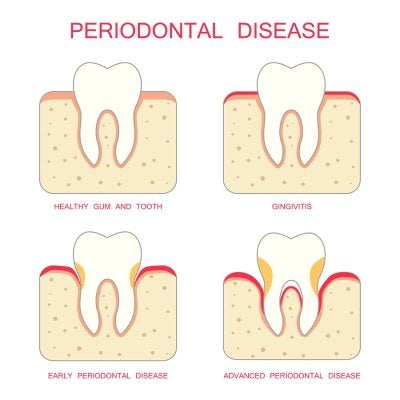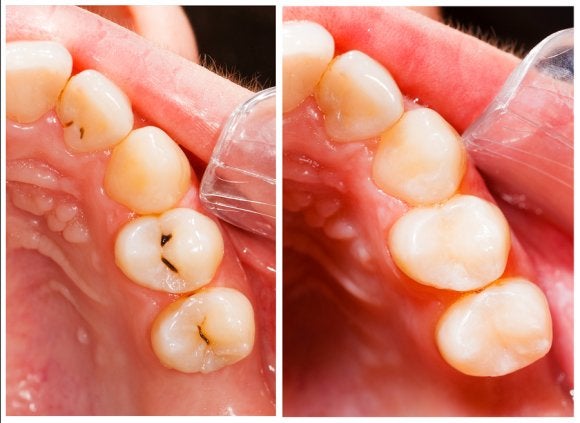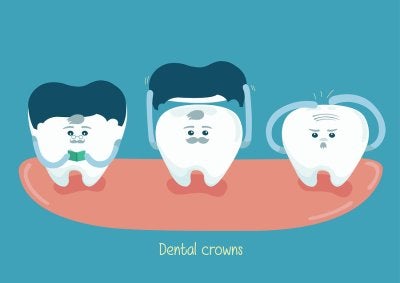-
The Oral Health Risks of Tobacco Use
Using tobacco products, including cigarettes and smokeless tobacco, can severely impact your oral health. As your dentist can explain, tobacco use dries out your mouth, decreasing the natural production of saliva. Saliva acts as a cleansing agent in the mouth, removing harmful bacteria that can cause plaque, tartar, and gum disease. The next time you visit your dentist in Bel Air , ask about the dangers of tobacco use.
Watch this video to learn more about the oral health risks associated with tobacco use. In the video clip, a dentist from the American Dental Association discusses how tobacco use increases your risk of developing infections, gum disease, tooth loss, and oral cancer.
-
Why It’s Important to Treat Gum Disease
Gum disease, or periodontal disease, is caused by poor dental hygiene. When plaque builds up on your teeth and hardens into tartar, it harbors harmful, dangerous bacteria. If not treated by a dentist or periodontist, this bacteria eventually causes gum disease. If you’re concerned that you might be suffering from gum disease in Bel Air , visit a dentist near you for treatment as soon as possible. Keep reading for information about why it’s important to treat gum disease.
Avoid Receding Gums
 If left untreated, the early, milder symptoms of gum disease will quickly progress into much more serious dental problems. Gum disease causes your gums to become inflamed, tender, and red. They will bleed easily, making you very susceptible to oral infections. Your gums will also begin to recede. If you visit a dentist regularly, or visit a periodontist at the first sign of gum disease, you can avoid developing receding gums.
If left untreated, the early, milder symptoms of gum disease will quickly progress into much more serious dental problems. Gum disease causes your gums to become inflamed, tender, and red. They will bleed easily, making you very susceptible to oral infections. Your gums will also begin to recede. If you visit a dentist regularly, or visit a periodontist at the first sign of gum disease, you can avoid developing receding gums. Prevent Tooth Loss
As gum disease continues to infect your gums and tissues, the gums will begin to pull away from the teeth. This causes spaces, or pockets, to form between the teeth and gums. These pockets are very vulnerable to infection, as it’s easy for bacteria and food to get trapped inside them. While the body’s immune system fights the bacterial infection, the bone and connective tissue that hold the teeth in place will begin to break down. If an emergency dentist or periodontist doesn’t intervene, you may eventually suffer from tooth loss.Decrease Your Risk of Developing Other Health Problems
The longer gum disease is left untreated, the more severe it becomes. Because it’s a very serious infection, it can spread to other parts of your body through your bloodstream. Your immune system will continue trying to fight the infection, which will tax your body’s resources, making you feel weak. If a dentist doesn’t treat gum disease, the infection can increase your risk of developing very serious health problems. Due to your weakened immune system, you will be much more susceptible to cardiovascular disease, diabetes, respiratory disease, and certain types of cancer. -
The Uses of Composite Fillings
Composite fillings are used in emergency dentistry, general dentistry, and cosmetic dentistry to restore and repair teeth. Composite fillings are created from a mixture of plastic and glass. They are tooth-colored, making them appear very natural and almost unnoticeable when used to repair a tooth. If your tooth is damaged, visit a dentist near you in Bel Air and ask about composite fillings.
If a tooth is cracked, damaged, chipped, or broken due to decay or trauma, your dentist may recommend removing the damaged portion of the tooth, and replacing it with a composite filling. The composite filling is applied to the tooth in layers, and a special light is used between each layer to harden it. After the filling is complete, the dentist shapes the composite to naturally fit the tooth and match surrounding teeth.
Composite fillings are often used because they look so natural. Your dentist can blend different shades together to perfectly match the natural color of your tooth. Composite fillings also bond to the remaining portion of the tooth, supporting its structure. This protects the tooth from further damage, and insulates it from sensitivity caused by temperature fluctuations. If a damaged tooth is left untreated, more significant treatments, such as root canal therapy, may become necessary.

-
An Inside Look at Root Canals
A root canal procedure is a method used by general and emergency dentists to save a tooth that has been infected due to decay or trauma. Root canal therapy is an alternative to undergoing a tooth extraction and then having to receive a dental implant or dentures to replace the missing tooth. If you’re in need of a root canal in Bel Air , keep reading to learn more about the procedure.
Why Root Canals Are Necessary
A root canal procedure is necessary if the tooth’s nerve is infected, or if the dental pulp is damaged. When this infection or damage occurs, the nerve root and pulp begin to break down, allowing bacteria to multiply in the pulp chamber. This bacteria can even cause an abscessed tooth. It can also lead to bone loss, drainage problems, or swelling in the face, neck, or head.
bacteria can even cause an abscessed tooth. It can also lead to bone loss, drainage problems, or swelling in the face, neck, or head. What Symptoms Indicate an Infection
If you’re suffering from an infected nerve root or damaged pulp, there may be a few obvious signs and symptoms that you’ll notice. You’ll experience a severe toothache, or intense pain when biting, chewing, or grinding. Your infected tooth will be extremely sensitive to hot and cold temperatures, even when the stimulus is removed. The gum tissue around the infected tooth will become tender, sensitive, inflamed, and swollen. You may notice that the infected tooth has become discolored, or appears darker than surrounding teeth.How a Root Canal Procedure Is Performed
A dentist or endodontist can perform a root canal procedure in the dental office. Your dentist will first take X-rays of your teeth to see how far the infection has spread. You’ll then be given local anesthesia. Your dentist will drill a hole into the infected tooth, through which he’ll remove the decayed nerve root, damaged dental pulp, and any other debris. The tooth is then thoroughly cleaned, injected with medication and antibiotics, and sealed with sealer paste and a rubber compound. Your dentist may recommend that a dental crown be placed on the tooth to further protect it. -
What Exactly Is Fluoride?
You probably know that you should brush your teeth twice a day using fluoride toothpaste. If you are not a dentist in Bel Air , however, you may not understand the significance of fluoride. This ion can help you keep your natural tooth enamel and avoid restorations like veneers down the road. Watch this video to learn more about fluoride.
Fluoride is an ion that can bolster your teeth and help them to fight against cavities. You can find fluoride in soil, water, and rocks, and it is added to some community water and mouth rinses. Fluoride is important because it combats the acids that attack your tooth enamel. If your diet involves a substantial amount of carbs, this is especially important. Your dentist can apply fluoride to your teeth at your next dental checkup, but it is important to use an accepted fluoride toothpaste when you brush your teeth on your own.
-
The Truth Behind Gum Disease Myths
In order to keep yourself in proper oral health, it is helpful to differentiate myth from truth. Unfortunately, there are many myths about gum disease that your dentist in Bel Air will confirm are false. Getting the facts about gum disease will allow you to react to the warning signs and prevent this condition from developing further. Read on for a look at the truth behind gum disease myths.
Myth: Proper Oral Hygiene Will Always Prevent Gum Disease
Practicing proper oral hygiene by brushing and flossing your teeth every day is a great way to keep your teeth and
gums in good shape. However, oral hygiene is not the only factor that determines your risk for gum disease. Even if you are completely dedicated to oral hygiene, there are other elements that may still put you at risk for this condition. Tobaccouse is one factor that may counteract your daily brushing and flossing. Your genetics, nutrition, and the level of stress that you endure on a daily basis may also impact your vulnerability to gum disease . While proper oral hygiene can certainly help, it is important to assess these other factors.
Myth: You Cannot Replace a Tooth Lost from Gum Disease
Advanced gum disease can lead to tooth decay and tooth loss, but this is by no means an indicator that you cannot have the tooth replaced. If you suffer from gum disease, you should be communicating with your dentist more frequently in order to treat the problem. In some cases, part of this treatment includes restorations like dental implants. A dental implant will replace your tooth and serve you with a number of benefits including retained bone mass and straight teeth.Myth: Gum Disease Cannot Affect Your General Health
Your oral health and general well being are linked in ways that many people are not aware of. It is important to realize that gum disease can impact your general health by further progressing other conditions like diabetes and heart disease. If you think you might be suffering from gum disease, it is wise to talk to your dentist immediately. -
Popular Ways to Improve Your Smile’s Appearance
It is possible to have properly functioning teeth that are not as aesthetically pleasing as you might want them to be. Individuals who encounter this problem typically look to cosmetic or general dentistry near Bel Air to have their teeth improved. There are a few different treatments that you can use to improve your smile, so it helps to talk to your dentist to find out which treatment is right for you. Keep reading if you would like to learn about some of the popular ways to improve your smile’s appearance.
Dental Crowns
A dental crown is a versatile treatment
that can address a number of issues. Your dentist may suggest a dental crown if you have one or more teeth that is diminished or damaged. A crown may be preferable to a dental filling if you have a tooth that has experienced a significant amount of decay. Your dentist can also use a dental crown as part of a dental implant procedure , which is a common form of treatment for missing teeth. In this case, you would have an implant applied to your jawbone with a dental crown attached to it to serve as a fully functioning—and cosmetically pleasing—tooth.
Teeth Whitening
Although it might not be quite as popular anymore, many people still use tobacco products on a daily basis. Other people depend on highly caffeinated drinks like coffee and tea to get them through the day. These habits can quickly lead to discolored teeth. Tobacco use may yellow your teeth, while frequent coffee and tea drinking can stain your teeth to a darker color. If your oral woes do not extend further than the shade of your teeth, consider teeth whitening. This can be done at home or in office and produces noticeable results.Dentures
If you are missing most or all of your teeth, you might consider improving your smile with dentures. Properly fit dentures can restore your ability to chew food, have a conversation, and smile with confidence. Talk to your dentist about the right types of adhesives to use in order to make the most of your dentures. -
Teeth vs. Food: The Good and the Bad [INFOGRAPHIC]
Everyone wants to have a beautiful smile full of healthy, white teeth. Depending on what you’re eating, however, you could be doing your teeth a disservice. Certain foods are better for your mouth than others, as your dentist near Bel Air will tell you. You probably know that both hard and chewy candies contain a lot of sugar, which can lead to tooth decay. You may be surprised to find out that even certain fruits are less than ideal for your teeth because they contain high levels of acid. Foods such as low-fat cheese, apples, and crunchy carrots are all mouth-healthy choices. Check out this infographic from Your Smile to learn more about what foods to eat and what to avoid for the health of your teeth and gums. Please share with your friends and family!

-
Spotting the Signs of Gingivitis
Failing to take care of your teeth properly and see your dentist in Bel Air on a regular basis can result in problems such as gingivitis. If left untreated, this condition may progress into periodontal disease and can result in tooth loss. It is helpful to familiarize yourself with the various signs and risk factors associated with gingivitis. Continue on if you could use some help spotting the signs of gingivitis.
The symptoms of gum disease are not always obvious, which makes the condition difficult to detect in some cases. One of the most prevalent red flags is the presence of blood when you brush your teeth. If you notice that your gums are bleeding, it is wise to schedule an appointment with your dentist in the near future. Your gums may also be swollen and tender to the touch. Another sign of gingivitis is shifting of your teeth or change in your bite. If you feel like your teeth do not fit together the way they usually do, visit your dentist to find out if you have gingivitis. Individuals who use tobacco products, practice poor dental hygiene, or have certain illnesses should be particularly wary regarding these signs.

-
The Dental Patient’s Guide to Crowns
It is important to set up a consultation with your dentist in Bel Air in order to determine what kind of dental treatment is best for your needs. However, it is also helpful to learn about the various types of procedures beforehand so that you can get an idea of what to expect. Dental crowns are used to treat many dental issues including weak or broken teeth, tooth decay, and missing teeth when used with dental implants. Read on for the dental patient’s guide to crowns.
Preparation and Procedure
If you and your dentist have decided that a dental crown is the optimal treatment for your situation, you will make two appointments. The first appointment presents your dentist with the opportunity to examine your teeth, gums, and jawbone. He or she may determine that a root canal treatment is necessary before going through with the dental crown procedure. After anesthetizing the tooth and gum tissue, your dentist will file down your tooth so that there is room for the crown to sit properly. He or she will then send an impression of your tooth to a lab, and a crown will arrive in two to three weeks . During the second appointment, your dentist will double check the permanent crown and then cement it.
appointments. The first appointment presents your dentist with the opportunity to examine your teeth, gums, and jawbone. He or she may determine that a root canal treatment is necessary before going through with the dental crown procedure. After anesthetizing the tooth and gum tissue, your dentist will file down your tooth so that there is room for the crown to sit properly. He or she will then send an impression of your tooth to a lab, and a crown will arrive in two to three weeks . During the second appointment, your dentist will double check the permanent crown and then cement it. Types of Crowns
Dental crowns are incredibly versatile in that there are many different types to choose from. Metal crowns tend to be among the most durable, and they typically require less removal of tooth structure. Ceramic and porcelain crowns, on the other hand, can be made to match your natural tooth color but tend to wear down over time. Dental crowns made completely of resin are most affordable, but they may also be most susceptible to cracking.Maintenance and Working Life
A dental crown can be an excellent restoration that improves the aesthetic appeal and function of your tooth, but it is important to care for them. Brush your teeth twice each day and floss once per day, and be sure to visit your dentist on a regular basis. Properly cared for crowns can last for up to fifteen years.
RECENT POSTS
categories
- Uncategorized
- General Dentistry
- Toothache
- Emergency Dentistry
- Family Dentistry
- Receding Gums
- Cosmetic Dentistry
- Veneers
- Gum Disease
- Gingivitis
- Dental Crowns
- Orthodontics
- Dental Implants
- Root Canal
- Wisdom Teeth
- Teeth Whitening
- Your Smile
- Composite Fillings
- Lumineers
- Dentures
- Invisalign
- BrightSmile
- Dental Bridge
- Abscessed Tooth
- Sealants
